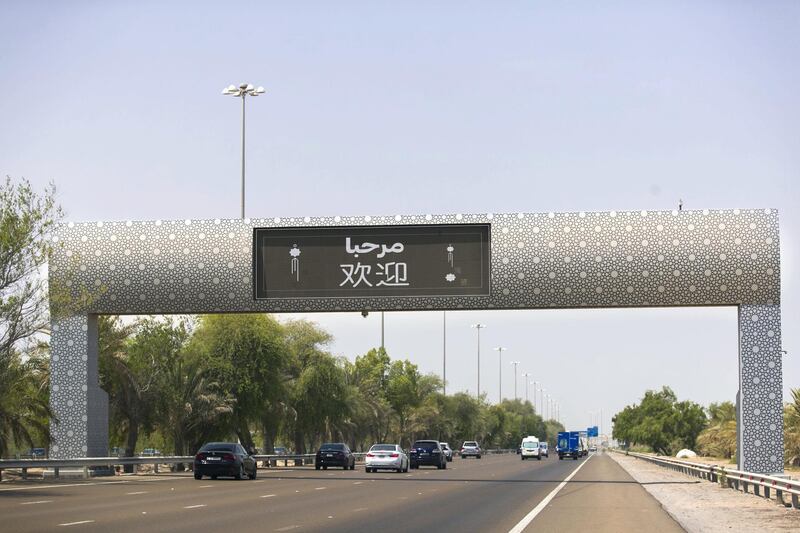When Chinese President Xi Jinping lands in Abu Dhabi tomorrow, there will be few in the UAE who are unaware of his arrival. In contrast to the visits of other heads of state, which can pass under the radar of those outside the diplomatic and media spheres, this trip is shaping up to be something more involving. With Chinese culture being celebrated around the country, the arrival of Mr Xi goes beyond politics.
Perhaps that is fitting, because the relationship with China has the possibility to impact the UAE beyond the leadership level, extending into trade, tourism, education and foreign policy.
To understand why the relationship between the UAE and China matters so much and why both sides are investing so much diplomatic energy in it, it helps to consult a map. It has only been five years since Mr Xi initiated the Belt and Road Initiative (BRI), the trillion dollar plan to connect vast parts of Asia, Africa and Europe through a new Silk Road.
The BRI is incredibly ambitious and, if it develops as planned, will have an impact on more than 70 countries and touch perhaps half the population of the world.
The Gulf sits at the very heart of it, literally and figuratively. The sea route that is planned from China goes through southeast Asia, up the coasts of India and Pakistan, into the Middle East and down the eastern coast of Africa – all areas with which the Gulf has cultural connections, language links and historic trade routes.
The UAE will be a hub for the BRI and over the coming years, the country will seek to utilise that position and its historic links to develop the relationship with China across three essential areas: energy, trade and alliances.
Energy is the most obvious connection and the one that is best known. China's demand for oil keeps rising and demand for products made from oil – plastics, pharmaceuticals and fertilisers – is rising even faster, leading the UAE to export more to the country and for Chinese inward investment into the UAE's oil and gas sectors to rise.
It is from trade, however, that the greatest growth can come. Trade with China is a huge prize for the UAE but its real value lies in re-export. With a small population, there is a limit to how many products the country can consume but the UAE is positioning itself as a hub to re-export China's produce to the rest of the Middle East, east Africa and beyond.
At the moment, more than half of all Chinese goods that come into the UAE go out to those markets and the expectation is that closer ties will make that number soar. Just this week the UAE's ambassador to China said the $50 billion in bilateral trade last year could double over the next decade. Given how rapidly some African and Arab countries are developing, that prediction could be conservative.
Closer trade will bring with it more business connections between China and the UAE, which will mean more tourism, conferences, aviation routes and ships, all of which benefit the UAE's economy and which will tie the UAE closer to the Asian superpower.
__________
Read more:
[ Podcast: the China-UAE bond strengthens ]
[ How Xi Jinping became China's most powerful leader ]
[ The Great Wall and the Great Hall: Sheikh Zayed's 1990 visit to China ]
__________
Many of the elements that the UAE hopes will diversify its economy from oil will benefit from a closer relationship with China: more Asian students will help cement the country as an educational hub, selling media to Asia will help it become an entertainment base and access to Chinese markets will help it become a start-up hub. In that phrase so beloved of Chinese diplomats, a closer relationship will really be a “win-win”.
Politically, of course, China is Asia's superpower and one of the permanent five on the United Nations Security Council. It has enormous influence, not only to support the UAE on issues that matter to it but to partner with the country and the Gulf on issues such as extremism, terrorism and poverty.
Both countries share a foreign policy perspective that poverty and lack of development breed instability and violence – one of the reasons both Beijing and Abu Dhabi have poured billions into aid for countries abroad is because they believe development can halt political chaos.
China, of course, also benefits from all these aspects of the relationship. Trade is a two-way street and energy security remains a huge challenge for it. But for China, the UAE, the Gulf and the Arab world are crucial to its rise to superpower status.
China sees the UAE and the Gulf as its bridgehead into the Middle East and Africa, not merely in terms of access to markets but as a way to create close political relationships. A good relationship with 22 Arab countries gives China strong diplomatic support in international fora like the United Nations.
The UAE, particularly, matters here. It will not have escaped Chinese attention that the UAE is consistently rated as the country other Arabs would most like their nations to emulate. A good relationship with a modern, outward-looking Arab Muslim country is essential for its international relations with other Muslim countries but also with its own substantial Muslim minority.
When Mr Xi lands tomorrow, he will be treated to the best that the capital has to offer. But both he and his hosts know that a strong relationship, properly cultivated, can bring immense benefits far beyond the cities of Abu Dhabi and Beijing.





